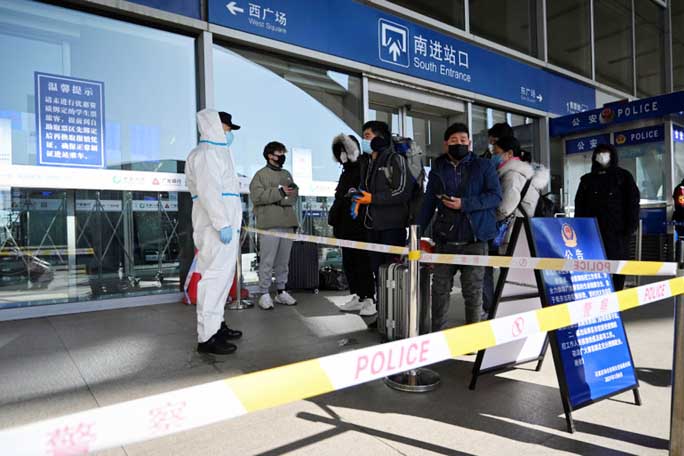
International Desk :
Chinese authorities told residents in two cities south of Beijing to stay home for seven days as they try to stamp out a COVID-19 outbreak in which more than 300 people have tested positive in the past week.
Shijiazhuang, capital of Hebei province which surrounds Beijing, suspended service on the city’s subway, then extended the ban to all public transport, including taxis. The province entered a “wartime mode” this week to battle the infections, report agencies.
At a media conference on Saturday, provincial authorities said mass testing for the virus had been conducted on 16 million residents of both Shijiazhuang as well as the neighbouring city of Xingtai.
Ma Yujun, deputy mayor of Shijiazhuang, said the city was working to locate the origin of the outbreak.
“We haven’t seen a clear turning point yet in this outbreak,” said Shijiazhuang official Ma Yujun. “The risk of expansion still exists.”
New Year celebrations
The curbs come ahead of the Lunar New Year, when hundreds of millions criss-cross China to visit family and friends. National Health Commission vice minister Zeng Yixin warned on Saturday the festival “will further boost the risk of transmission”.
Shijiazhuang and Xingtai are restricting people to their communities and villages and have banned gatherings, according to notices posted on social media.
Hebei reported 14 more confirmed cases in the latest 24-hour period, bringing the total in the ongoing outbreak to 137. It has found another 197 people without symptoms who tested positive. China does not include such asymptomatic cases in its confirmed count.
Beijing is requiring workers from Hebei to show proof of employment in Beijing and a negative COVID-19 test before entering the nation’s capital. Chinese media reported hours-long backups at entry points on Friday.
In a separate outbreak, three more cases were reported in Liaoning province in the northeast, bringing the total there to 84 since the first cases surfaced about three weeks ago. Beijing has had 31 cases over the same period, though no new ones in the past 24 hours.
Some 3,000 medical personnel have been mobilised to support the mass testing of all 11 million residents of Shijiazhuang, while the entire province has entered “wartime mode” to contain the outbreak.
Anti-corruption authorities earlier announced three local officials were punished for failing to reel in the virus’s spread, after a state media commentary censured the provincial government for being ill-prepared and lacking transparency.
China on Saturday separately announced that vaccines against the coronavirus will be free nationwide.
“Ordinary people will not need to spend a penny,” Zheng Zhongwei, a National Health Commission official, said at a news conference.
Authorities are racing to roll out vaccines with more than nine million doses given so far.
Health authorities recently gave conditional approval to a vaccine candidate by Chinese pharma giant Sinopharm, with emergency use jabs already administered in the later part of 2020.

